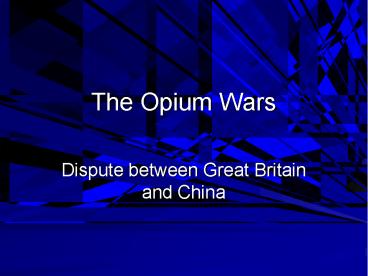The Opium Wars - PowerPoint PPT Presentation
Title:
The Opium Wars
Description:
The Opium Wars Dispute between Great Britain and China Growth of Opium Trade Europeans bought silk, tea, porcelain, and spices from China Chinese would only trade ... – PowerPoint PPT presentation
Number of Views:187
Avg rating:3.0/5.0
Title: The Opium Wars
1
The Opium Wars
- Dispute between Great Britain and China
2
Growth of Opium Trade
- Europeans bought silk, tea, porcelain, and spices
from China - Chinese would only trade goods for silver
- Drain on European finances
3
Opium Trade
- Opium manufactured in China since 15th century
for medical purposes - Opium then mixed with tobacco so it could be
smoked - Dutch were first to begin trade of opium
- English soon followed
- Chinese government banned smoking and trade of
opium in 1729 due to health and social issues
4
English East India Company
- Held monopoly on production and export of opium
in India - Peasant cultivators often coerced and paid in
advance for cultivation of poppies - Sold in Calcutta for a profit of 400
5
East India Company
- Buy tea on credit in Canton
- Sell opium at auctions in Calcutta, India
- Then it was smuggled into China through India and
Bengal - 1797 began direct trade of opium into China
- Chinese government had hard time controlling
trade in South
6
Napier Affair
- Lord Napier tried to circumvent the Canton Trade
laws to reinstitute East Indias monopoly - Governor of Macao closed trade with Britain
September 2, 1834 - British resumed trade under old restrictions
7
First Opium War 1834 - 1843
- 1838 Chinese instituted death penalty for native
traffickers of opium - March 1839 new commissioner to control opium
trade Lin Zexu - Lin imposed embargo on Britain unless they
permanently ended the trade trade
8
First Opium War
- March 27, 1839 British Superintendent of Trade
Charles Elliot demanded all British subjects
turn over opium to him - Opium amounting to a years worth of trade was
given to Commissioner Lin - Trade resumed with Britain and no drugs were
smuggled
9
First Opium War
- Lin demanded British merchants to sign a bond
promising not to deal opium under penalty of
death - Lin disposed of the opium dissolving it in the
ocean - Did not realize the impact of this action!
10
First Opium War
- British merchants and government regarded this as
destruction of private property - Responded by sending warships, soldiers, and the
British India Army into China June 1840 - Had superior military force attacked coastal
cities, defeated Qing forces easily
11
End of the War
- British took Canton and sailed up the Yangtze
River - Took Tax Barges, cut revenue of imperial court of
Beijing - 1842 Qing sued for peace
- Ended with Treaty of Nanjing
12
Treaty of Nanjing
- Referred to as the Unequal Treaties accepted
1843 - China
- Ceded Hong Kong to the British
- Opened ports to British Canton, Amoy, Fuzhou,
Ningbo, Shanghai
13
Treaty of Nanjing
- Great Britain received
- 21 million ounces of silver
- Fixed tariffs
- Extraterritoriality for British citizens on
Chinese soil - Most favored nation status
- Allowed missionaries into interior of China
- Allowed British merchants sphere of influence in
and around British ports
14
Treaty of Nanjing
- Unresolved Issues
- Status of opium trade with China
- Equivalent American treaty forbade opium trade
with China - However, both Americans and British were subject
only to the legal trade of their consuls
15
Second Opium War 1856 - 1860
- Also known as Arrow War
- Followed incident when Chinese bordered British
registered, Chinese owned ship the Arrow - Crew was accused of piracy and smuggling
- Were arrested
16
Second Opium War
- British claimed ship was flying British flag and
was protected under the Treaty of Nanjing - War delayed by Taiping Rebellion and Indian
Mutiny - British attacked Guangzhou one year later
- Aided by allies of United States, Russia, and
France
17
Second Opium War
- Treaty of Tientsin was created in July 1858 was
not ratified by China until 2 years later - Hostilities broke out in 1859 when China refused
the establishment of British Embassy in Beijing - Fighting erupted in Hong Kong and Beijing
- British burned the Summer and Old Summer Palace
and looted the city
18
Treaty of Tientsin
- 1860 ratified the treaty at the Convention of
Peking - Britain, France, Russia and the United States
would have the right to station delegations in
Beijing (a closed city at the time) - Ten more Chinese ports would be opened for
foreign trade, including Niuzhuang, Danshui,
Hankou and Nanjing - The right of foreign vessels including warships
to navigate freely on the Yangtze River
19
Treaty of Tientsin
- The right of foreigners to travel in the internal
regions of China for the purpose of travel, trade
or missionary activities - China was to pay an indemnity to Britain and
France in 2 million taels of silver respectively,
and compensation to British merchants in 2
million taels of silver. - The Chinese are to be banned from referring to
Westerners by the character "yi" (barbarian). - Legalized the import of Opium































